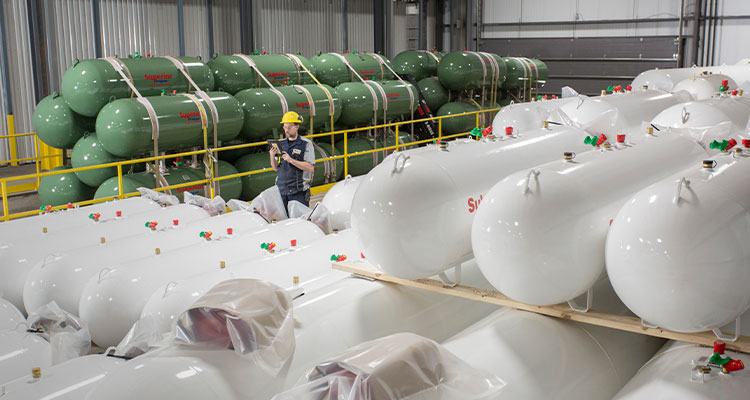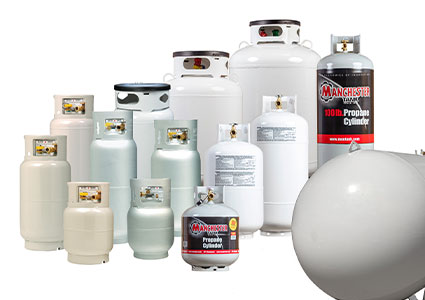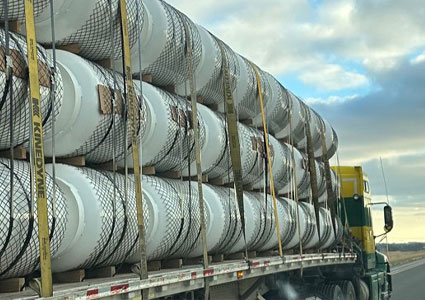
Manchester Tank remains at the forefront of the industry, consistently delivering superior products and services
Founded in 1946, Manchester Tank began as a small family business on Manchester Avenue in Los Angeles, California. At that time, the only product they manufactured was a five-gallon vertical tank for storing butane and propane gas, primarily used by mobile homes. Over the years, Manchester Tank’s dedication to excellence and innovation enabled significant expansion of its operations. President Jordan de Lima outlines the journey: “ Over the course of its history, the business grew into multiple facilities that, in 1999, were purchased by McWane, a family-owned company specializing in manufacturing, based in Birmingham, Alabama. This remains our parent company today.
 “McWane has always maintained a growth-through-acquisition strategy, so we’ve continued to evolve the business, expanding the number of products we produce. We’ve also transitioned our facilities more toward a network model. Overall, the company’s primary focus remains on pressure vessels for the propane industry as well as the industrial sector, including fire, chemical and compressed air applications.”
“McWane has always maintained a growth-through-acquisition strategy, so we’ve continued to evolve the business, expanding the number of products we produce. We’ve also transitioned our facilities more toward a network model. Overall, the company’s primary focus remains on pressure vessels for the propane industry as well as the industrial sector, including fire, chemical and compressed air applications.”
Today Manchester Tank is a leading OEM and refurbisher of steel and aluminum DOT cylinders and ASME pressure vessels. For decades, the company has been at the forefront of designing, manufacturing and refurbishing tanks and cylinders to ensure the safe storage and transport of propane, chemicals, compressed air and other industrial applications. Serving commercial, residential and industrial markets – including propane and chemical storage, forklifts, fire suppression, air compressors and refrigerant systems – the products are purposefully designed and engineered to meet rigorous requirements, ensuring efficient storage while maintaining safety standards.
Built with high-quality materials, Manchester Tank products ensure durability and longevity, are designed to withstand corrosive environments and meet stringent safety standards and provide users with peace of mind. Manchester Tank not only offers quality products but also provides comprehensive support, maintenance tips and troubleshooting advice. Whether for residential or commercial application, the products are designed for easy installation, saving time and effort. Furthermore, the business is always expanding its capabilities, emphasizing quality, service and simplicity.
Jordan elaborates on the range of products and services that Manchester Tank offers: “In the propane market segment, we manufacture everything from a small, five-pound cylinder that you might take camping to a 1000-gallon tank used for residential heating. That’s a fairly large range. In fact, we’re one of the only companies offering such breadth. In the industrial market segment, we produce all types of fire cylinders for fire extinguishers and compressed air tanks – from small units to a large air compressor system that would be used in factories.”
Last year Manchester Tank acquired Ditech Testing, a Canadian-based firm specializing in refurbishment services that extend the lifespan of DOT cylinders and ASME tanks for the liquid petroleum industry. Ditech can handle units ranging from 33 lbs. to 2000 gallons, catering to the largest propane suppliers, with efficient systems that set benchmarks in quality and turnaround time at every critical stage.
One-stop shop
Jordan continues, “Refurbishment is where the market has been heading – toward preserving assets. If a customer buys new tanks, elongating the lifespan of that asset is really important for cost savings. Refurbishment has become a fairly relevant trend. We take a used and somewhat dated asset, send it to be shot-blasted, repainted and recertify it with new valves. The steel is retained, but everything else gets replaced. The addition of Ditech enables our customers to reduce costs by saving depreciating assets, and they can take advantage of Ditech’s logistics management process, ensuring tanks are recertified on time and arrive seamlessly at their required destination.
“Instead of building this unique service from scratch, we looked at the industry to identify the best company for providing refurbishment services. We started to work with Ditech in partnership and eventually turned that into an acquisition. They’ve been a great complement to what we can offer. 
“Now, we are the only company in the industry that can provide everything from the smallest possible sizes all the way up to very large 1000-gallon new tanks and offer refurbishment services. So, we really are a one-stop shop for all of our customers.”
Another benefit of acquiring Ditech is the enhancement of transport capabilities. Ditech managed its own logistics with trucks, drivers and the ability to transport truckloads of tanks. Jordan adds, “Running a logistics company is very complicated and it would have been difficult and expensive to develop independently. Now that we’ve acquired Ditech, we are in the midst of assessing how we can expand upon that logistics network to eventually handle all transportation for Manchester and Ditech.”
Providing this new service requires leveraging Ditech’s capabilities and integrating them into existing facilities. Jordan continues, “For example, in the six months since the acquisition, we’ve integrated refurbishment capabilities into our Campbellsville, Kentucky, facility. That gives us a huge, very important capability to reach customers in that location.
“Refurbishment requires us to pick up a tank, bring it back to a facility, refurbish it and return it to the customer. Logistics is therefore very important. The closer we are to that market, the more access it gives us to customers. Being able to have a refurbishment facility in Campbellsville allows us to tap into the Southeastern market much more efficiently.”
Significant innovation
With the acquisition of Ditech, significant innovation within the company has been fostered. Market opportunities were explored to develop an enhanced product, leading to the launch of the premium Manchester PRO line of propane tanks. This line features an enhanced coating that lasts significantly longer, especially in areas with salt spray. It also includes telemetry for data monitoring and sensing levels, allowing propane companies to remotely understand how much propane is in the tank, which is becoming a popular trend in the industry.
Additionally, the line includes more precise componentry, such as capacitance gauges. Jordan emphasizes, “It’s a little bit more technical, but it really matters because being able to understand exactly how much propane is in a tank is very valuable information to the propane company that has to refill it. Imagine if a truck arrives at a location, for example, and the gauge was wrong, and the tank is 90 percent full, that’s a waste of a trip. So, telemetry and more precise componentry are very important, and that’s what we offer with the Manchester PRO line.”
Looking to the future, Jordan shares the company’s strategic approach for the mid-to-long-term. “We want to enter new product segments and new industries. This inherently means different pressure regulations or sizes based on pressure. This will enable us to enter the medical gases sector, as well as any other types of pressure gases, in which we’re not currently active. That would be a huge asset for us. There are a lot of synergies to be had in those types of industries.
“I also think in the coming years we’re going to start to see an emphasis on alternative fuels for transportation, particularly in the commercial fleet space. I think cars and vehicles running on propane or LPG will become more prevalent. That’s an area that is going to grow for us in the future,” he concludes. “We want to spend some research and development time making sure that we can be a leader in the autogas space as it returns.”